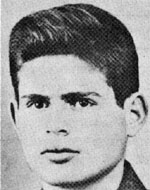Preger, Haim
Son of David and Henia. He was born on May 17, 1948, in Kibbutz Yagur, where he continued to study at the high school until he graduated from school. He was always devoted to his parents, cared for them during sickness and weakness, and tried to keep them from going too far, laughing always and always wanted to be close to him and his company, he was good at Lev, he was the first to organize trips and parties and wanted all the kids to be Simcha and satisfied. Who became a member of the kibbutz, was drafted into a school settlement (Yad Hannah), and even before he left for the army, he learned to take up arms and defend the border. His dedication and willingness led him, like many other members of the kibbutz, to the paratroopers’ paratroopers, and was prominent in the creation of Yad Hannah’s life, building, and success, and in October 1967 he was drafted into the IDF. This was after he finished his third year in Yad Hannah. He would do everything in his best and carry out any task that was imposed upon him in quiet and safe and without a word. He obeyed his commanders, tried hard and strove for the best in his positions. He had traveled through many arduous maneuvers and maneuvers, and with great courage and silence he held the machine gun that they had not taken out of his hand. During the entire period of his service he was an outstanding soldier, proved efficient and devoted and was admired by his commanders. But on the 21st of Adar 5738 (March 21, 1968) Chaim set out for a reprisal action against the Jordanian sabotage bases, known as the Karameh operation (the town east of the Jordan in which the enemy saboteurs were deployed to Israeli territory). Haim participated in this operation and fell. About two weeks after completing his training in the Paratroopers Brigade. He was laid to rest at the cemetery in the Yagur farm. “Haim was one of the best soldiers in the unit, and despite the relatively short time of his service in the army, he underwent basic training, was successful in them and was one of the best soldiers, and as such he fell,” the commander of the unit, who served as Chaim, wrote to his parents in the letter of condolence. Yagur Farm published a booklet in his memory. Hakibbutz Hame’uchad’s memoir “Who Fell in the War” was mentioned. In Volume 4 of “Goily Ash,” the satchel of the estate of the sons who fell in the Israeli wars, was brought from his estate.
